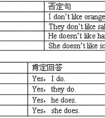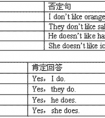You may laugh when you see dog owners talk to their pets as though they were human. Although dogs cannot speak a human language, they seem to understand how you-七年级英语
题文
| You may laugh when you see dog owners talk to their pets as though they were human. Although dogs cannot speak a human language, they seem to understand how you feel. Sounds strange? Now scientists have found that dog and human brains deal with sound and emotion情感in a similar way. This may help to explain the language problem. To compare human and dog brains, a scientist called Attila Antics and his team tested 11dogs and 22 humans. Both group listened to almost 200 dogs and human sounds. From crying to laughter and playful barking吠. At the same time, the team scanned扫描both group’s brain activity. The scientists found that a similar part in both brains was activated激活when animals ad people heard human voices and emotional sounds, such as crying and laughter. Also, emotional dog voices, such as angry barking also caused a similar action from human and dog volunteers. We know very well that dogs are good at tuning和..协调into the feeling of their owners, and we know a good dog owner can find emotional changes in their dog. But we now begin to understand that this similarity may help to explain this can be. 小题1:we can know from the first paragraph that ___
|
答案
小题1:D 小题2:B 小题3:A 小题4:B |
试题分析:这篇短文主要介绍了虽然狗不会说人类的语言,但他们似乎了解人的感受。现在科学家们发现,狗和人类大脑以类似的方式处理声音和情感。通过这种相似性就能解释为什么狗能了解人的感情。 小题1:细节理解题。根据短文第一段的大意,虽然狗不会说人类的语言,但他们似乎了解人的感受。现在科学家们发现,狗和人类大脑以类似的方式处理声音和情感。故选D 小题2:细节理解题。根据第二段. At the same time, the team scanned扫描both group’s brain activity.描述,故选B 小题3:是非判断题。根据第一段Now scientists have found that dog and human brains deal with sound and emotion情感in a similar way描述,现在科学家们发现,狗和人类大脑以类似的方式处理声音和情感。故选A 小题4:标题归纳题。根据文章的主旨大意,狗能了解人类的感情。故选B |
据专家权威分析,试题“You may laugh when you see dog owners talk to their pets as ..”主要考查你对 实义动词,实义动词的单数第三人称形式,动词短语 等考点的理解。关于这些考点的“档案”如下:
实义动词实义动词的单数第三人称形式动词短语
考点名称:实义动词
- 实意动词:
即行为动词,表示动作的动词。实义动词与系动词是相对的,能独立用作谓语。
它分为及物动词和不及物动词两种:
及物动词是指后面要求有直接宾语的动词;
不及物动词指后面不需要跟宾语的动词。 实意动词使用方法:
及物动词
后面必须跟宾语意义才完整的实义动词,叫做及物动词(transitive verb)。如:
I believe that the committee will consider our suggestion.我相信委员会将会考虑我们的建议。
“How long can I keep the book ?”Harry asked.哈里问:“这本书我可以借多久?”
Dr. Bethune set us a good example. 白求恩大夫给我们树立了好榜样。
Crude oil contains many useful substances.原油含有许多有用的物质。
不及物动词
本身意义完整后面不须跟宾语的实义动词,叫做不及物动词(intransitive verb)。如:
Birds fly.鸟会飞。
It happened in June 1932.这件事发生于一九三二年六月。
My watch stopped.我的表停了。
She spoke at the meeting yesterday evening. 她在昨天晚上的会上发了言。
兼作及物动词和不及物动词
英语里有不少实义动词可以兼作及物动词和不及物动词。这样的动词又有两种不同的情况
a)兼作及物动词和不及物动词时,意义不变。试比较:
Shall I begin at once?我可以立刻开始吗?(begin作不及物动词)
She began working as a librarian after she left school.她毕业后当图书馆管理员。(began作及物动词)
When did they leave Chicago?他们是什么时候离开芝加哥的?(leave 作及物动词)
They left last week. 他们是上周离开的。(left 作不及物动词)
b)兼作及物动词和不及物动词时,有时意义不尽相同。如:
Wash your hands before meals.饭前要洗手。
Does this cloth wash well? 这布经得起洗吗?- 英汉实意动词用法比较:
与汉语的比较,有时英语动词的及物和不及物的用法,与汉语的用法不一样,请注意下列两种情况:
a)有的动词在英语里只能用作不及物动词,而汉语则可用作及物动词,如arrive到达,agree同意,listen听。英语里这些动词后面常接介词。如:
We arrived at the railway station at noon.
我们于中午到达火车站。(at不能省去)
(比较:We reached the railway station at noon.)
Everybody listened to the lecture with great interest.
每个人都很有兴趣地听讲课。(to不可省去)
(比较:We all heard the lecture.)
Do they agree to the plan?他们同意这个计划吗?(to不可省去)
b)有的动词在英语里能用作及物动词,而在汉语里则不能用作及物动词,如serve为…服务。
Our children are taught to serve the people wholeheartedly.
我们的儿童被教以全心全意为人民服务
用于be动词之后,实义动词之前。 实意动词的用法:
肯定句:
- 最新内容
- 相关内容
- 网友推荐
- 图文推荐
| [家长教育] 孩子为什么会和父母感情疏离? (2019-07-14) |
| [教师分享] 给远方姐姐的一封信 (2018-11-07) |
| [教师分享] 伸缩门 (2018-11-07) |
| [教师分享] 回家乡 (2018-11-07) |
| [教师分享] 是风味也是人间 (2018-11-07) |
| [教师分享] 一句格言的启示 (2018-11-07) |
| [教师分享] 无规矩不成方圆 (2018-11-07) |
| [教师分享] 第十届全国教育名家论坛有感(二) (2018-11-07) |
| [教师分享] 贪玩的小狗 (2018-11-07) |
| [教师分享] 未命名文章 (2018-11-07) |


![How much does it ______ to fly from Yancheng to Hainan Island?[ ]A. cost B. payC. spend D. take-七年级英语](http://www.00-edu.com/d/file/ks/4/2/shiyidongci/2020-01-05/small7dcf2f05998de63e10cc3629787031c81578210087.png)

![He always _____TV in the evening. He _____ listening to the radio. [ ]A. watch, don't like B. watches, doesn't like C. watching, don't like D. watch, do-七年级英语](http://www.00-edu.com/d/file/ks/4/2/shiyidongci/2020-01-05/small45d599b4a60b84e61cec210bfbf051f51578214524.png)
![I'd rather ___ to the Mcdonald's Restaurant because I like to listen to quiet music.[ ]A. to go B. going C. go D. went-八年级英语](http://www.00-edu.com/d/file/ks/4/2/shiyidongci/2020-01-05/small1767bba1727fef2c035c53dcbd9bc20e1578209517.png)
